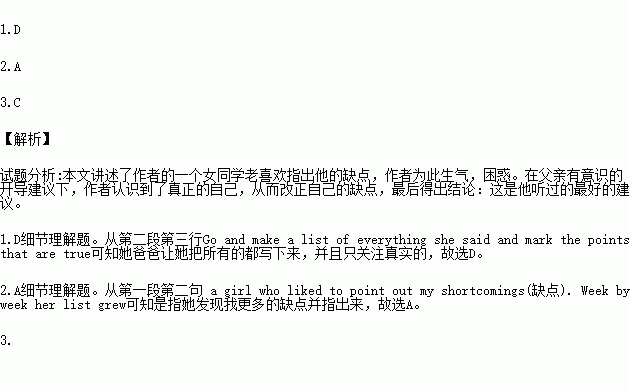题目内容
When I was about 12, I had an enemy, a girl who liked to point out my shortcomings(缺点). Week by week her list grew: I was very thin, I wasn’t a good student, I talked too much, I was too proud, and so on. I tried to hear all this as long as I could. At last, I became very angry. I ran to my father with tears in my eyes.
He listened to me quietly, and then he asked, “Are the things she says true or not? Janet, didn’t you ever wonder what you’re really like? Well, you now have that girl’s opinion. Go and make a list of everything she said and mark the points that are true. Pay no attention to the other things she said.”
I did as he told me. To my great surprise, I discovered that about half the things were true. Some of them I couldn’t change (like being very thin), but a good number I could—and suddenly I wanted to change. For the first time I got a fairly clear picture of myself.
I brought the list back to Daddy. He refused to take it. “That’s just for you,” he said. “You know better than anyone else the truth about yourself. But you have to learn to listen, not just close your ears in anger and feel hurt. When something said about you is true, you’ll find it will be of help to you. Our world is full of people who think they know your duty. Don’t shut your ears. Listen to them all, but hear the truth and do what you know is the right thing to do.”
Daddy’s advice has returned to me at many important moments. In my life, I’ve never had a better piece of advice.
1.What did the father do after he had heard his daughter’s complaint?
A. He refused to take the list and have a look at it.
B. He told her not to pay any attention to what her “enemy” had said.
C. He was angry and told her to overcome her shortcomings.
D. He told her to write down all and pay attention only to the things that were true.
2.What does “Week by week her list grew” mean?
A. Week by week she discovered and pointed out more shortcomings of mine.
B. She kept on adding new ones to the list so it was growing longer and longer.
C. I was having more and more shortcomings as time went on.
D. Week by week, my shortcomings grew more serious.
3.Which do you think would be the best title for this passage?
A. My Father
B. My Childhood
C. The Best Advice I’ve Ever Had
D. Not an Enemy, but the Best Friend

